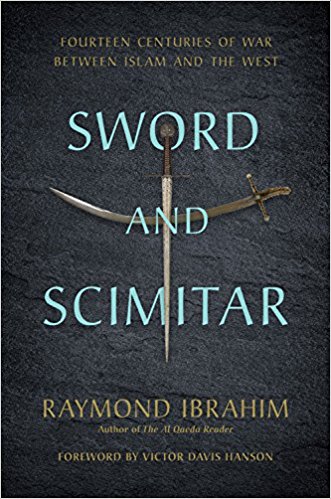
Khalid ibn al Waleed Battle Warrior IslamSword of Allah.
What role, if any, did Islam play in shaping Europe’s identity, both in the past and present?
Ahmed Akbar, chair of Islamic Studies at American University and author of the new book Journey into Europe: Islam, Immigration, and Identity, claims that Islam had a largely positive impact on Europe’s identity (including by invoking the Myth of the Andalusian Paradise). Thus, any European suspicion or rejection of Muslim migrants is wholly unwarranted. As Akbar elaborates in a recent article:
To understand what is happening in European politics and society today, it is necessary to understand European identity, which can be interpreted in three distinct categories — primordial identity, predator identity, and pluralist identity.
Primordial identity emphasizes one’s unique culture and traditions, and predator identity indicates the aggressive, even militaristic lengths that people will resort to in order to protect their identity. Predator identity can be triggered due to perceived threats including globalization, unemployment, economic instability, and the greed and failure of elites. Add the presence of immigrants, and a society can move in extreme and bloody directions which challenge the very notion of a modern democracy.
Note that for Akbar, Europe’s “predator identity” is only “triggered due to perceived threats” — as if Islam never posed any real threat.
As is often the case whenever the sophists apologize for Islam and blame Europe, reality is the exact opposite. Both past and present, Islam’s own well documented “predator identity” — which manifested itself in centuries of jihad and atrocities — was and is responsible for the “militaristic lengths that [non-Muslim] people will resort to in order to protect their identity.”
Hence the irony: yes, Europe’s identity is largely a byproduct of Islam — but hardly in the way the apologists claim.
“If we … ask ourselves how and when the modern notion of Europe and the European identity was born,” writes historian Franco Cardini, “we realize the extent to which Islam was a factor (albeit a negative one) in its creation. Repeated Muslim aggression against Europe between the Seventh to Eighth Centuries, then between the Fourteenth and the Eighteenth Centuries … was a ‘violent midwife’ to Europe.”
By way of examples, Cardini cites “Turkish Sultan Mohammed II and Suleiman the Magnificent” — who alone were responsible for the slaughter and enslavement of hundreds of thousands of Europeans, always in the name of jihad. They “forc[ed] the continent to defend itself and to find ways and means of concerted action, encouraged it towards a stronger sense of self — and strong sense of ‘the Other.’
Similarly, after summarizing centuries of Islamic invasions, Bernard Lewis writes; “Thus, at both its eastern and southwestern extremities, the limits and in a sense even the identity of Europe were established through first the advance, and then the retreat, of Islam.”
It is, incidentally, for this reason that tiny Europe’s self-identity never revolved around ethnicity or language — hence why such a small corner of the Eurasian landmass (Europe) still houses dozens of both, some widely divergent, while much larger landmasses are homogenous — but rather religion. It was the last and most redoubtable bastion of Christendom not to be conquered by Islam.
This becomes evident when one understands that the West is actually the westernmost remnant of what was a much more extensive civilizational block that Islam permanently severed.
As documented in my new book, Sword and Scimitar: Fourteen Centuries of War between Islam and the West, non-stop jihad and terror saw three-quarters of the post-Roman Christian world become Islamic, leaving the remaining quarter — Europe proper — in a permanent state of embattlement.
Moving to the present, the war has taken a different form — one partially built on presenting the antithesis of the true history between Islam and the West; that is, through dissembling. While millions of Muslim migrants, many of whom exhibit that old Islamic hostility and contempt for the infidel, are brought into Europe, those who try to resist the takeover are counseled not to be “triggered due to perceived threats.”
Thus Akbar’s article, “Italy must remember its pluralist past,” is dedicated to convincing Italians to be even more welcoming of Muslim migrants, “without reviving a predator identity that led to destruction on a catastrophic scale in the last century. They must act before it is too late.”
Whatever was “catastrophic” about the last century has no applicability to the question of welcoming a flood of hostile, unassimilable Muslim migrants.
If we’re going to evoke the past in the context of prompting Europeans to “act before it is too late,” the truth of what Muslims have done in and to Italy and the rest of Europe is what was and continues to be responsible for, to quote Akbar’s own words, the “militaristic lengths that [Europeans] people will resort to in order to protect their identity.”







